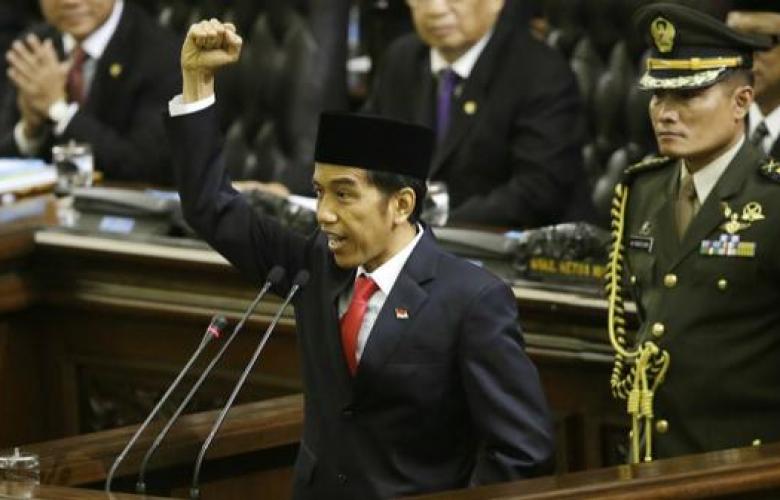Years of living prosperously? Jokowi's nine priorities for equitable development
Contact
Years of living prosperously? Jokowi's nine priorities for equitable development
President Jokowi and his team are committed to making sure their economic initiatives encompass as many areas of the country as possible and have the greatest impact on the people of Indonesia.
Jokowi launched Nawa Cita, a Sanksrit term for nine priorities in the first year of his presidency in 2014. The philosophy laid out what work needed to be done to achieve a greater economic potential for everyone, not just political stakeholders and investors in what some observers are heralding as a new era of prosperity and success across the country. The nine priorities are:
1. Return the state to its task of protecting all citizens and providing a safe environment by protecting maritime interests, borders, natural resources and migrant workers as well as increasing the military budget and building a professional police force.
2. Develop clean, effective, trusted and democratic governance by allowing open access to public information, reforming the bureaucracy, improving public services, increasing the role and participation of women and having greater accountability from government institutions.
3. Develop Indonesia’s rural areas by cutting overheads and allocating more to improve public services, implementing village laws and structuring new autonomous regions for the welfare of more people.
4. Reform law enforcement agencies by building a culture of law by resolving historic human rights violations, eradicating judicial mafia, prioritizing reform of the judiciary, strengthen the corruption eradication commission and combating drugs and psychotropics.
5. Improve the quality of life and the quality of education and training through the Indonesia Pintar (Smart Indonesia) programme with 12 years of compulsory and free education; improving public health services through the Indonesia Sehat (Healthy Indonesia) programme; pushing forward land reforms and developing more housing.
6. Increase productivity and competitiveness by constructing new roads, new airports, new seaports, new industrial estates, more traditional markets, and providing a one-stop service to process investment and business licenses, setting up a development and infrastructure bank, and building regional science/ technoparks, academies and vocational schools.
7. Promote economic independence by developing domestic strategic sectors by expanding irrigation systems, opening 1 million hectares for rice paddies outside of Java, building a bank for farmers and small businesses, promoting energy exploration to cut energy imports, constructing more gas pipelines, increasing research in agriculture and industry and targeting a tax ratio of 16%.
8. Overhaul the character of the nation by reorganizing the educational system by including civic education, history, patriotism and character-building, evaluating national exams, providing subsidies to state universities and providing finance for research and technology development.
9. Strengthen the spirit of “unity in diversity” and social reform by promoting tolerance, reinforcing mutual cooperation as social capital through social reconstruction, strengthen diversity education and create space for dialogues between all people.
Equitable development means accelerating development in those regions that have been left behind. And it's happening on a scale never seen before.
Infrastructure is one of the most obvious examples of this, along with rising investments in projects outside of Java, which in Q3 of 2017 reached 45% of the national investment, but it also includes other aspects such as ensuring a one-price gasoline policy and distribution of the Indonesia Health Card.
Cutting Through The Red Tape
There are still some issues that need to be addressed. Encouraging investments by making paperwork easier is one of them. Jokowi has, on several occasions, mentioned the importance of making the current licensing system easier and more in line with other countries in the region such as Singapore, Malaysia and Thailand.
Labor heavy industries and the manufacturing sector need to be fully supported forward. Currently, the government is working to prepare what it calls the single submission system to ease the licensing process and significantly cut down the waiting time for industries for the issuance of their permits.
The second set of challenges still making it hard for the country to achieve more is overlapping regulations and conflicting regulations.
The Indonesian Investment Coordinating Board (BKPM) has been receiving reports and complaints related to the large number of regulations and how they often change overnight, hampering businesses from working optimally.
Expatriate Work Permits
Work permits, notably for expatriates, is another red-tape heavy problem that the government is focusing on. As Indonesia enjoys the vast improvement in investment and the growth of industrial estates and special economic zones throughout the archipelago, there is an increasing need for the country to make it easier for expatriates to obtain the correct work permits.
The inflow of skilled expatriates is a necessity, as they can assist industries with their expertise and in the transfer of knowledge as well as further growth.
Interconnect With Infrastructure
Infrastructure development projects are another issue that the country needs to resolve and improve upon.
The massive infrastructure development projects that Jokowi has launched to make the country even more interconnected, to distribute the development further and fairly, to accelerate the poverty alleviation program are applauded by many.
The projects, however, need to develop ways to involve the private sector on a larger scale. The achievements the country has been enjoying in the first three years of Jokowi's administration are positive signs that Indonesia has huge potential and many opportunities to improve.
It shows the Indonesian people have the quality and resources needed to move forward, and that strong capable leadership with the full support of the people will lead to prosperity, equality, and security.
Sources: World Bank, Dr Leila Mona Ganiem, Ditik, Republika, Time
Similar to this:
Investor confidence boosted in Indonesia’s government and economy
Central Bank: Indonesia residential property prices up 3.32% in Q3 2017
destinASEANplus 2018 set to increase Bali’s bourgeoning MICE market





